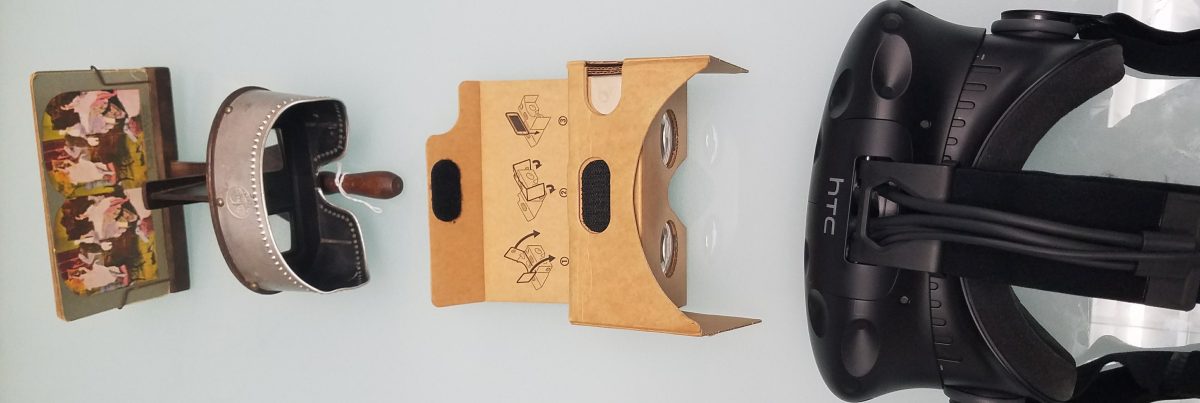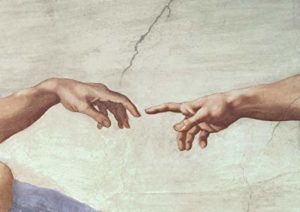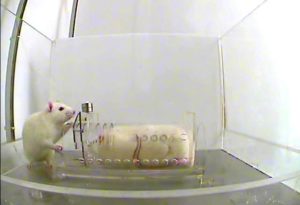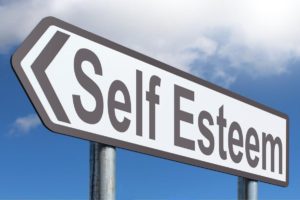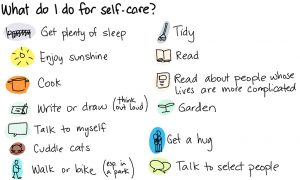
Photo by mohamed hassan from Pxhere
I’m sitting in my room. I’m not sure what everyone else is doing so I get up and check with my roommates. Generally, there are three outcomes: someone is watching TV and the others are on their phones, everyone is on their phones, or everyone is in their room and either on their laptop or their phones. With these outcomes as a result, it gets me to wonder how people spent time with one another in the previous decades. Technology and social media seem to have changed the way that humans interact. Does the way we interact with technology make us less human than we once were? Are we more human than before? What defines us as human?
Do Androids Dream of Electric Sheep by Philip K. Dick suggests that empathy is what makes us human. Empathy is thought to be what makes us human because it is our ability to care for other living things by seeing life in their shoes. This is seen in caring for people with the empathy box as well as the pets that they own. People can care for a pet in a very similar way they can care for a child. Philip K. Dick has animals play a very important role in his book. Animals are rare in the book because they are becoming extinct from the radioactive fallout that has overtaken the rest of earth from World War Terminus. In this world, animals have not only become a status symbol, but a source of empathy.
This becomes the basis for the Voight Kampff test. This test is used by Rick Deckard to tell Humans apart from Androids. What this test focuses on is empathy and has a tighter focus on how humans feel about animals. The idea behind this is that androids don’t feel emotions but are instead programmed to act like they do in order to make them human-like. Eventually androids become very similar to humans and the test starts to have trouble being able to distinguish the two. The one question that still gets the androids isn’t about animals, but about other humans. While this does work for the test it might not work in today’s world.
Humans don’t always have empathy for each other like we do with pets or animals. This can also be seen through social media today. While we learn about a lot more tragedy and good news about other people we have become numb to the bad news. We would probably feel worse today if a panda had died over a group of students that were killed in a mass shooting.
An example of this is Harambe the gorilla. He was killed after a child fell into his cage and he started dragging the child. While the zookeepers were concerned for the child’s safety, most of the vocalizations were from people against his death over using a tranquilizer dart or blaming the mother for being irresponsible and letting her child get into the enclosure. This event dragged on through the internet for many months where mass shootings like the Vegas shooting were covered for maybe a week. Months later however, Harambe was still important to some people and a joke to others. The way that this incident spread throughout the internet was way more talked about and seen on the internet more than the mass shootings around those months.
With school shootings this is a different story. We learn of these shootings when they happen and while these events are very sad and tragic we hear about them so much that it can be hard to empathize with each event like we did the first time we heard of a mass shooting. I don’t think that this takes away our humanity though. Maybe we just don’t have enough sorrow to give anymore. Maybe we spread it out to so many different events that it just doesn’t show anymore. Empathy is seen as this great source of humanity, but I don’t think everyone sees empathy in the same way.
Empathizing 101 by Allie Grasgreen talks about a study that is being done to test if empathy can be taught among college students. It also defines empathy as a helpful tool in achieving critical thinking skills. Empathy in this article is more focused on seeing another person’s opposing viewpoint to your own. This is a helpful skill that should be taught among people, but do others think of empathy this way? It also asks other questions that we would think of as a more traditional view of empathy such as feeling protective of others being taken advantage of or feeling moved by other people’s lives in a positive or negative way. From an academic standpoint all of these things are important to learn. Empathy shouldn’t need to be taught because it should already exist within ourselves. What we would learn is to actually use it or to understand people’s points of view when making decisions or helping them. Without this understanding of empathy, we would still be human, even if it didn’t seem like it.
Our world is becoming smaller and smaller with social media. This lets everyone express their opinions, but it also lets everyone else destroy/ negate their opinion as well. This can be seen a lot with the political division of the United States. So many people today are less likely to even consider the other sides point of view anymore that empathy is drowned out. The internet can be bad for empathy because we can find a group of people that agree with our opinions and disagree with the same people we do. This can give us a sense of not needing to get along with everyone because we have other people we get along with. Even with this type of behavior in the real world, does this make us less human?
Reading books and watching films makes you kinder in real life By Léa Surugue can show where this still applies. A study was done to show that people who read fiction were generally more empathetic than people who did not read fiction. This could mean that in fiction it might be easier to understand empathy because we don’t really have a choice other than to relate to the character. If we read more fiction we would start to find things that we relate to with these fictional characters. What we can probably be taught from this is that maybe it isn’t a matter of not having empathy, but instead not trying to feel empathy towards certain people.
I think that empathy is part of what makes us human, but it also isn’t the only thing that makes us human. People might be a little less socially affected but tragedies in today’s world, but I don’t think they are any less empathetic. With events like Harambe’s death we can see the outcry of people towards animals that shows we can still be empathetic. We are all still human because empathy isn’t the only factor to look at. With other emotions and consciousness, you can combine this with empathy to make humanity. I think people haven’t lost their sense of humanity because empathy alone doesn’t define it. People might just need to listen to others outside of their groups in order to empathize with them. If we never listen, we can’t empathize and if we can’t empathize, we can’t understand each other. We need to have this type of empathy in order to be human, but it isn’t what makes us human.
Philip K. Dick’s character Rachel is an android, but by the end of the book she reacts to something in a very human way. After spending time with Deckard, she decides that since he is going to kill other androids that she didn’t want him to kill that she should go to his house and murder his goat. This type of reaction wouldn’t be a logical one because he was going to do this regardless if she killed the goat or not. This gives Rachel human-like qualities that we should acknowledge. It also leads to prove a big point that androids and humans aren’t that different. The only thing that was different between androids and humans was empathy. The androids put so much effort in the book to figure out why empathy was something that people held on too and it was inevitably pointless. If humans lacked empathy would they not be human though? I think humans would still be humans. All of the non-human-like things that the androids do are still things humans do. Humans kill animals all the time, humans kill other humans all the time, they even experiment on animals to see how they might react with certain diseases or other things wrong with them. While these things are considered bad we still do them as humans because in our minds they are for a greater good. We kill animals for food, we kill people in war to protect our country, we experiment on animals to make sure that the drug we are testing is safe for humans, but does that lack empathy?
Humans can have empathy but that doesn’t mean that they have to use it for everything that they do. If we used empathy for everything that we did our society would have to be structured completely different because typical human behavior would have some problems in this scenario. Many people have had to deal with this from war. In war you are surrounded by humans that are literally taking the lives of other humans. Those humans could have had a spouse and kids that will never see them again, but we kill them for the greater good for ourselves. Maybe we want more land, maybe we want more resources, but why take the lives of others for it? When you think about war like that it really points out how cruel it can be. In our world we make it prideful to serve our country. This seems like a normal thing but the root behind it is to possibly take the lives of others in a time of conflict and everyone is encouraged to do this. Does this make people in the military not human? Of course not. It is something that we have grown to accept because countries don’t get along and we need to keep up our countries defenses to protect and defend ourselves. Sometimes countries even feel the need to attack in order to get something that they feel they need or want. This doesn’t make them not humans though.
Humans are way more complex than just a biological being with empathy added in. We don’t always use it because we have grown to feel that it isn’t useful or possibly damaging to use it all of the time. While social media has made it seem like humans are less empathetic I think that there is something else to look at here. Humans probably still didn’t care as much about each other back then as they could because of multiple factors like race or gender. Trying to feel empathetic back then was something that people did not do because they were different and it wasn’t worth the time until history decided to make it worth the time. Now instead of avoiding people that weren’t like us we don’t feel empathetic to people like us. This could be because of technology bringing us closer together or it could be because of some other factor that we don’t fully understand. We can’t fully tell how humans would have been in the past with the technology we have today, but I also think that it probably wouldn’t make them any less empathetic, they might just use their empathy for different people than they would have before.
Works Cited
Dick, Philip K. Do Androids Dream of Electric Sheep. Del Rey, an Imprint of Random House, 2017.
Grasgreen, Allie. Empathizing 101. 24 November 2010. <https://www.insidehighered.com/news/2010/11/24/empathizing-101>.
Surugue, Léa. Reading books and watching films makes you kinder in real life. 19 July 2016. <https://www.ibtimes.co.uk/reading-books-watching-films-makes-you-kinder-real-life-1571434>.
